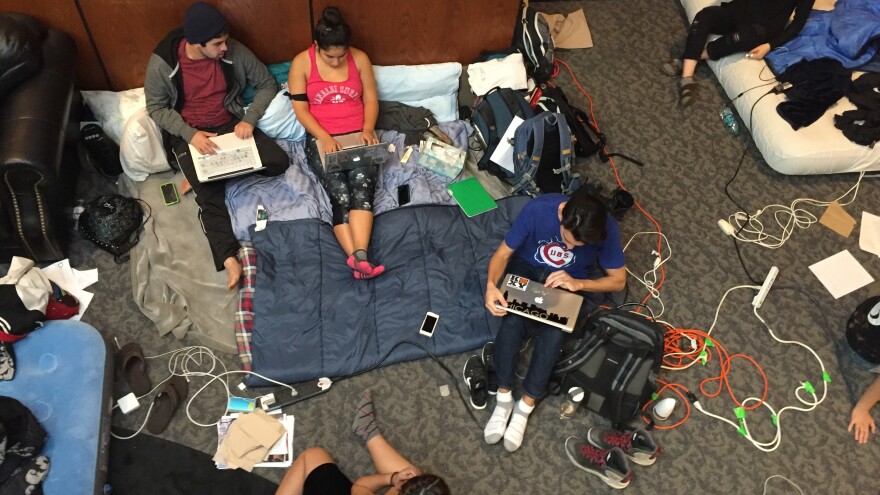Protests over racial discrimination on college campuses are leading to some swift responses and pledges of reform by college administrators. Even as the protests themselves appear to be quieting down ahead of the Thanksgiving holiday, activists are pledging a prolonged fight.
In northeast Los Angeles, the small, liberal arts Occidental College bills itself as one of the most diverse campuses in the U.S. Just over 40 percent of "Oxy" students are of color, and President Obama himself attended Occidental for two years before transferring to Columbia University.
Yet it's easy to find people like Raihana Haynes-Venerable.
She's a junior from Chandler, Ariz. who says she faces subtle — and sometimes overt — racism on campus almost every day.
For her, changing the culture of Occidental College starts inside the offices of the school's president and top administrators.
Inspired by the protests at University of Missouri, Haynes-Venerable and a multiracial mix of fellow students took over an administrative building for a week — camping out on air mattresses, holding workshops on diversity.
Sympathetic professors have even held classes in the building.
Where are the administrators?
"They're gone; they completely cleared out," Haynes-Venerable says.
These students gave administrators a list of 14 demands to address what they say are systemic racial biases on campus.
The student activists say their voices often aren't heard in classes, they feel isolated on campus, and they are routinely profiled by security at night.
Among their list of demands is a fully funded Black Studies program, an increase in tenured faculty of color and the creation of a vice president for diversity.
"I think through the teach-ins we've been hosting, the workshops and the personal dialogues we've been having with each other, we've really created the Occidental that we were promised and that we wanted," Haynes-Venerable says.
What's happening here at Oxy is not unique. At nearby Claremont McKenna College, student protests led to the resignation of a high-ranking administrator over comments that were seen as racially charged.
At Princeton, students celebrated after school administrators promised to consider removing tributes to President Woodrow Wilson, a supporter of racial segregation.
In all these protests across the country, students say they feel marginalized. Benjamin Reese, chief diversity officer for Duke University in North Carolina, says it's a frustration that's long been raised in the wider black community, especially now with the recent outcry against police shootings of unarmed black men.
"I examine and see what's happening on college campuses as happening in the context of the kind of struggle that's going on nationally around race," he says.
Reese says it's a movement to take seriously, but it's far too early to compare it to the black student protests of the civil rights era, as some have — though he says some of the early successes are remarkable.
At Occidental, administrators have already outlined, and in some cases are showing, how they'll comply with all but one of the students' 14 demands — that of the resignation of the president.
"We want the students to know that we're ready and we know we must join them at the table," says Marty Sharkey, the college's spokesman.
Why didn't they act sooner?
"That's a great question. I think there are some items on there that I think have been issues that have been out there for awhile, others are newer requests, so that's why they haven't been responded to," Sharkey says.
The student protesters say they plan to hold the administrators accountable to that in the weeks and months ahead, even though their occupation of Occidental's administrative building has ended.
Copyright 2021 NPR. To see more, visit https://www.npr.org. 9(MDEwMTk5OTQ0MDEzNDkxMDYyMDQ2MjdiMw004))



